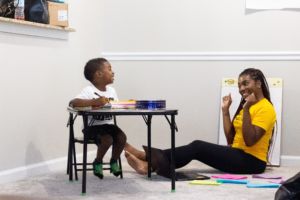
How many times, you ask? Exactly HOW many times can I say the word pop? At a regular pace, probably 20. At a slower pace so each sound is heard, probably 8. At a higher decibel, another 12 times…. That’s about 40 times saying the word pop. Not to mention giving 3 examples, with the words; ‘bop’, ‘cop’, and ‘sop’. After repeating one of the simplest words to rhyme, with all these hints, cues, and a week of practicing this every single day, you want to tell me the word ‘arm’ rhymes with pop?! If life was a Disney film, I just became the living embodiment of the emotion ‘anger’ from Inside Out.
It’s hopeless.. Or so it seems. But that’s the beauty of learning, and the joy of working with kids. Little Jason didn’t say ‘arm’ because he can’t rhyme with the word pop. He said it because he was staring at my arm the entire time! Like a lot of kids his age, he was daydreaming. Instead of listening, he said the first thing that came to his mind.
Here’s a tip from someone that has been driven delirious with the frustration of wanting someone to “just get it.” In these moments, laugh it off.
“Really Jason?!” I joke, getting closer to him, putting my hands on my hip, tilting my head, “You think ARM rhymes with pop! POP! POP?! After I already gave you bop, cop, sop, what about top, rop, mop!?”
“Uhh HOP!” Jason says triumphantly.
“YES!” I exclaim giving him a fist bump and cueing his classmates to give him the “firecracker cheer”. Little Jason doesn’t know how close he came to making me reconsider this entire profession. Saved only by the realization that rhyming is NOT something you can learn overnight.
“Although repetition can appear annoying, repetition plays an integral role in education.”
Here are some tips:
1. Be prepared to repeat yourself
2. Give ALL the examples you can (the more the merrier)
3. Made up words rhyme too, in the beginning not every word needs to be real as long as they can hear or make it (ex: you can rhyme shark with gark even though gark isn’t a real word)
4. Make it fun!! There are a lot of games, activities, and worksheets that can be used as resources that will surely engage your learners
Although repetition can appear annoying, repetition plays an integral role in education. Studies show that students that were taught using repetition scored higher than those that didn’t. Therefore, prepare to repeat yourselves out there! Check out this website that gives very informative structure on how you can best teach rhyming https://blog.allaboutlearningpress.com/teach-rhyming/.
“The instruction of rhyming is integral to preventing low reading ability.”

Can we just skip rhyming and teach something else? Not with knowledge that research has shown students who are taught how to rhyme between the ages of 3-5 are less likely to become struggling readers. The instruction of rhyming is integral to preventing low reading ability. Here is a great website that is geared towards families with resources you can use for rhyming activities https://www.famly.co/blog/eyfs-rhyming-games-children.
Finally, for my last piece of sage advice as you go out there and make ‘rhymers’ of the kiddos, please do not make the rookie mistake of asking students to rhyme with the words duck, grass, or ram. If you decide to ignore this advice, you’ll soon learn…. The hard way.

